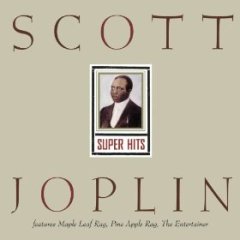Scott Joplin - Super Hits (2000)
Scott Joplin - Super Hits (2000)

1 The Entertainer 4:18 2 Maple Leaf Rag 3:20 3 The Easy Winners - A Ragtime Two Step 3:28 4 Peacherine Rag 3:35 5 Elite Syncopations 3:38 6 Cleopha (March and two-step) 2:50 7 Original Rags 4:27 8 Pine Apple Rag 3:33 9 Bink's Waltz 4:44 10 The Strenuous Life (a ragtime two-step) 3:32 11 Sunflower Slow Drag (A Ragtime Two-step) 4:02 12 Paragon Rag 3:42 13 Great Crush Collision - March 4:02 E. Power Biggs – pedal harpsichord
Classical musicians have been featured playing ragtime since Joshua Rifkin's bestselling albums of the late 1960's. Many of these classically-influenced performances were appealing, but at the same time seemed a little stiff, a little pedantic, like badly played Handel. In contrast, E. Power Biggs, the Bach organ virtuoso, makes Scott Joplin really live. He opens up some intriguing new dimensions in this collection of rags, recorded in 1973.
Biggs performs the music on the pedal harpsichord--which would seem to be an unlikely choice--but the percussive quality of the harpsichord makes the syncopations clear and crisp. The magnificent instrument used, made by John Challis, has a range of timbres, and Biggs combines and varies these so the different pieces each have their own character. The bass is played on foot pedals, and the left hand plays the chords on the off-beat. The right hand plays the melody on a separate keyboard, assigned a different voice for clarity. It sounds less like a baroque performance than a ragtime string band--something like the mandolin-guitar-string bass combinations of the ragtime era.
While Biggs maintains the syncopations of the pieces, there is not a strong African American feeling. He doesn't rag that thing. But he has a wonderful ear for the chorale-like harmonies in Joplin, and a natural sense of the phrasing of the pieces that brings out the structure. He slows just a little at the final chord that marks the end of each melodic strain, and then picks up the tempo in the next strain, as if the piece was getting its second wind. These tempo changes are subtle, but the effect is very satisfying. Along with the tonal variations, the phrasing helps keep this somewhat-formulaic music from sounding all the same.
The pieces performed will be familiar to Joplin listeners: Maple Leaf Rag, of course, and the usual selections such as Original Rags and The Easy Winners. The approach is different enough that hearing the standard rags does not seem like covering old ground. On the other hand, it is sad that Biggs, like the rest of the classical world, overlooked all the other ragtime composers, and the related early jazz of musicians like James P. Johnson or Willie "The Lion" Smith (who composed the 12th Street Rag). It would have been very interesting to hear what Biggs would have done with these more complex works. ---L. Carmichael, amazon.com
download: uploaded anonfiles yandex 4shared solidfiles mediafire mega filecloudio nornar
Zmieniony (Piątek, 17 Styczeń 2014 10:08)
